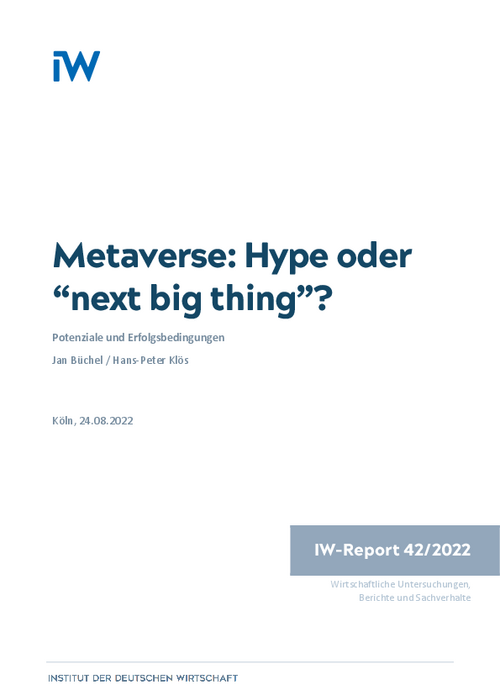Not only since the Facebook group renamed itself Meta in October 2021 has the topic of metaverse gained substantial importance. Experiences due to the corona pandemic have also spurred digital applications to a great extent.

Metaverse: Hype or "next big thing"?

Not only since the Facebook group renamed itself Meta in October 2021 has the topic of metaverse gained substantial importance. Experiences due to the corona pandemic have also spurred digital applications to a great extent.
At its core, the vision of the metaverse describes the transition from "flat" media in 2D, which is primarily limited to what is seen on a screen, to immersive media in 3D, through which people are increasingly immersed in virtual worlds and virtual content or environments are perceived as real. The metaverse is a persistent and immersive simulated 3D world in which different users interact simultaneously to enjoy entertainment, transact via cryptocurrencies or work remotely. Actions in the metaverse between different using persons happen synchronously and in real time, and there is interoperability between different applications. With its features of three-dimensionality, persistence, real-time and interoperability, the metaverse is seen as the "next logical step of the internet" and the "next big thing".
However, the Metaverse is still at the very beginning of its development. Experts are still divided on the question of whether and how quickly a metaverse will establish itself. However, considerable economic and social potentials are already seen in important domains of economic and social life: The world of work is increasingly permeated by the use of extended reality tools such as VR (virtual reality) and AR (augmented reality), whereby digital elements (such as artificial worlds) can be linked with real elements (such as using persons or companies). The "Industrial Metaverse" is developing digital twins for process optimisation, virtual labs, virtual showrooms and global 3D collaborations. In education, hybrid human-AI solutions can combine the strengths of human and artificial intelligence to enable personalised learning and integrate it into the learning process. In healthcare, the use of AR and VR can make surgeries more risk-free and 3D models can contribute greatly to simulation visualisation, telepresence training, tracking and health data management.
Further technological development cannot be adequately categorised without considering the importance of gaming technologies and their prevalence for the development of a metaverse. Both the analysis of the provider perspective and the demand side in Germany point to a special enabler role of games for the emergence of the metaverse. The opportunities for a broad technological basis in Germany exist: An analysis of data from the company database crunchbase, which contains mainly young companies and start-ups, assigns individual industry sectors to the various metaverse levels. With possible multiple entries, the database extraction identifies over 6,300 entries of companies whose profile offers services for individual levels of the metaverse, most of them in the technical infrastructure level (telecommunications sector with 2,646 active companies as well as cloud and edge infrastructure (1,077)), but also the gaming sector (510). All meta-levels show a clearly disproportionate share of small companies. This shows firstly the importance of start-ups for technological breakthroughs and secondly the sustainable basis for important technological development in Germany that has already been created. This should also be seen as an opportunity by policymakers to a much greater extent than before and supported accordingly.

Metaverse: Hype or "next big thing"?

More on the topic

Further training needs of the automotive industry in transformation
Due to the ecological and digital transformation, significant parts of the German economy, particularly the industrial sector, are currently undergoing a transformation. This development also extends to the automotive sector, which occupies a vital position in ...
IW
Valuing Companies' Data
Data is becoming increasingly important both for companies and for national economies. Since the full potential of business data can only be realised when several users exploit it simultaneously, data sharing is also becoming more common.
IW